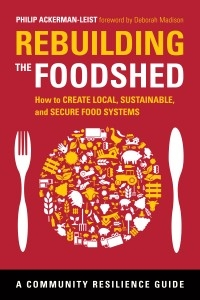Rebuilding the Foodshed
How to Create Local, Sustainable, and Secure Food Systems
From the Acknowledgements section on, Philip Ackerman-Leist’s newest book is highly enjoyable, sincere, and informative. An associate professor at Vermont’s Green Mountain College, Ackerman-Leist heads up the Farm and Food Project at the college and has years of experience in homesteading. So, when he asks questions about sustainable and local food, it is from a deeply personal perspective. Readers will appreciate the well-researched arguments and examples, as well as the academician behind them.
Ackerman-Leist embarks on a personal challenge to define these buzzword categories of “local” and “sustainable.” He exhaustively tackles all of the logistics of creating a truly local food system as he engages and entertains readers. With good humor, he describes how a world of possibilities will open up if people accept the reality of anaerobic digesters converting human waste into useful biogas, an “ecological sanitation” type of processing that could get phosphorus into our soil and even power our cars.
Key to Ackerman-Leist’s goals is engaging more members of the community in local food initiatives. Addressing the growing problem of food insecurity as it relates to underutilized or lack of local food systems, as well as taking on the food justice issue, must be priorities for concerned locavores. In searching for answers, he highlights several groundbreaking citizen/producer-owned programs as well as problematic status quo operations. Getting healthy food into the hands of all people requires that we pull the elitist label off of anyone who has an interest in healthy, local food. The author’s writing style entirely succeeds in making an academic line of questioning feel fun, relevant, and accessible to all who are interested.
Ultimately, this is a great book that will catapult readers into a highly critical understanding of the many complex issues with food and localized agriculture in the United States, as well as offer possible solutions. Ackerman-Leist writes with lively panache, an unlikely but somehow well-suited style for talk of such serious problems. This book is highly recommended for anyone who hopes to be part of the evolution.
Reviewed by
Carrie Wallace
Disclosure: This article is not an endorsement, but a review. The publisher of this book provided free copies of the book and paid a small fee to have their book reviewed by a professional reviewer. Foreword Reviews and Clarion Reviews make no guarantee that the publisher will receive a positive review. Foreword Magazine, Inc. is disclosing this in accordance with the Federal Trade Commission’s 16 CFR, Part 255.

